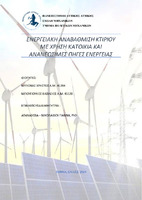| dc.contributor.advisor | Ατανάσοβα-Νικολαΐδου, Γιάννα | |
| dc.contributor.author | Μυλωνάς, Χρήστος | |
| dc.contributor.author | Μπουγιούκος, Βασίλειος | |
| dc.date.accessioned | 2024-09-02T10:08:12Z | |
| dc.date.available | 2024-09-02T10:08:12Z | |
| dc.date.issued | 2024-07 | |
| dc.identifier.uri | https://polynoe.lib.uniwa.gr/xmlui/handle/11400/7349 | |
| dc.identifier.uri | http://dx.doi.org/10.26265/polynoe-7181 | |
| dc.description.abstract | Οι ενεργειακές ανάγκες σήμερα καλύπτονται ως επί των πλείστων με τη χρήση συμβατικών καυσίμων και ορυκτών πόρων π.χ. λιγνίτης, πετρέλαιο, μαζούτ και φυσικό αέριο. Η αυξανόμενη χρήση αυτών των πηγών έχει οδηγήσει σε σοβαρές περιβαλλοντικές επιπτώσεις, με την κλιματική κρίση να είναι η σοβαρότερη σε παγκόσμιο επίπεδο. Η Ευρωπαϊκή Ένωση όπως και άλλοι φορείς έχουν αναλάβει πολυάριθμεςπρωτοβουλίες, και η Ευρώπη είναι αποφασισμένη με παραπάνω πρόβλημα είναι η αξιοποίηση των ανανεώσιμων πηγών ενέργειας (ΑΠΕ), οι οποίες είναι ανεξάντλητες και φιλικές ως προς το περιβάλλον. Η αξιοποίηση των ΑΠΕ έχει αυξηθεί δραματικά τα τελευταία χρόνια ενώ η χρήση τους γίνεται ακόμη και σε οικιακό επίπεδο.Συνεπώς, η παρούσα εργασία επικεντρώνεται στην τεχνοοικονομική μελέτη εγκατάστασης ενός υβριδικού οικιακού συστήματος στην περιοχή της Αττικής, στο νότιο προάστιο την επιβολή κανονισμών να μειώσει τη χρήση συμβατικών καυσίμων.Μία από τις λύσεις για το Άλιμος. Για την πραγματοποίηση της μελέτης χρησιμοποιήθηκε το λογισμικό HomerPro και αναλύθηκαν τέσσερις μελέτες περίπτωσης. Τα αποτελέσματα αναλύονται εκτενώς αποδεικνύοντας πως ένα καλά μελετημένο υβριδικό σύστημα σε οικιακό επίπεδο δύναται να μειώσει συντριπτικά τη χρήση συμβατικών καυσίμων για την ικανοποίηση των ενεργειακών αναγκών των χρηστών μιας οικίας. | el |
| dc.format.extent | 90 | el |
| dc.language.iso | el | el |
| dc.publisher | Πανεπιστήμιο Δυτικής Αττικής | el |
| dc.rights | Αναφορά Δημιουργού - Μη Εμπορική Χρήση - Παρόμοια Διανομή 4.0 Διεθνές | * |
| dc.rights.uri | https://creativecommons.org/licenses/by-nc-sa/4.0/deed.el | * |
| dc.subject | Ενεργειακή αναβάθμιση | el |
| dc.subject | Ανανεώσιμες πηγές ενέργειας | el |
| dc.subject | Περιβάλλον | el |
| dc.subject | Ενέργεια | el |
| dc.subject | Φωτοβολταϊκά συστήματα | el |
| dc.subject | Αιολικά συστήματα | el |
| dc.subject | Υβριδικά συστήματα | el |
| dc.title | Ενεργειακή αναβάθμιση κτιρίου με χρήση κατοικία και ανανεώσιμες πηγές ενέργειας | el |
| dc.title.alternative | Energy upgrade of a residential building using renewable energy sources | el |
| dc.type | Διπλωματική εργασία | el |
| dc.contributor.committee | Εξαρχάκος, Γεώργιος | |
| dc.contributor.committee | Makrygiannis, Panagiotis | |
| dc.contributor.faculty | Σχολή Μηχανικών | el |
| dc.contributor.department | Τμήμα Πολιτικών Μηχανικών | el |
| dc.description.abstracttranslated | Energy needs today are mostly covered by the use of conventional fuels and fossil resources such as lignite, oil, fuel oil and natural gas. The increasing use of these sources has led to serious environmental impacts, with the climate crisis being the most serious at the global level. The European Union as well as other actors have taken numerous initiatives, and Europe is determined with above problem is the use of renewable energy sources (RES), which are inexhaustible and environmentally friendly. The use of RES has increased dramatically in recent years and their use is even at the domestic level. Therefore, this paper focuses on the techno-economic study of the installation of a hybrid residential system in the south suburb of Attica, Attica, Greece to enforce regulations to reduce the use of conventional fuels. One of the solutions for Alimos. Homer Pro software was used to carry out the study and four case studies were analysed. The results are analysed extensively demonstrating that a well-designed hybrid system at the residential level can overwhelmingly reduce the use of conventional fuels to meet the energy needs of a home's occupants. | el |


